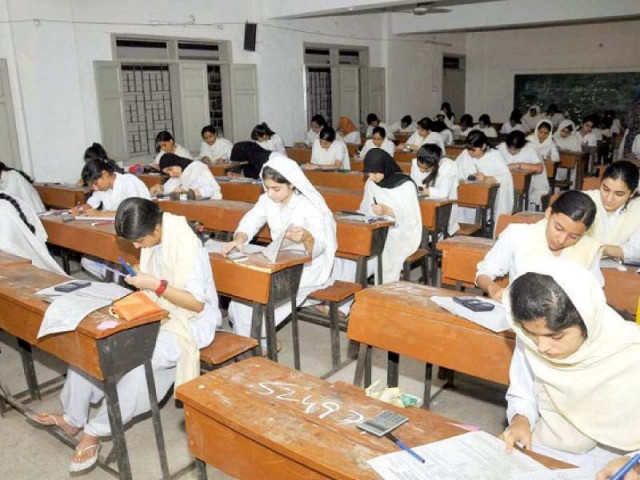Sindh fails to adapt to shift in exam policy
No visible steps are being taken in the province to conduct examinations under the Student Learning Outcome initiative

Under the country’s examination reform programme, prompt arrangements are being made in all provinces except Sindh to conduct annual Matriculation and Intermediate examinations for the year 2022 on basis of curriculum instead of textbook-learning.
Whereas, Sindh’s education boards have remained rather mum about the nationwide development, and no visible steps are being taken in the province to conduct examinations under the Student Learning Outcome initiative.
Owing to which, it is feared that while students across the country will be tested on practical abilities and capacity to understand course material, pupils in Sindh will have to remain reliant on rote-learning and cramming methods.
The development in the public education sector is a result of a meeting conducted at the behest of Inter-Board Committee of Chairmen (IBCC) in October, where all boards of education, including Sindh’s, agreed to modify the existing examination system. The motivation for the reform was to take students out of the current system of mechanic memorising and encourage them to adopt a more conducive learning process.
It was decided at the meeting that under the said scheme, all boards of education would initially introduce a system called Student Learning Outcome (SLO) in Matriculation and Intermediate examination papers, where examination paper structure will be based 30 pc on knowledge of subject matter, 50 pc on understanding and 20 pc on application of concepts under higher cognitive level.
When Hyderabad Board of Intermediate and Secondary Education’s Nazim Examiner Masroor Ahmadzai, was probed regarding Sindh’s readiness to adopt the change in examination pattern, like the rest of the country, he corroborated that Hyderabad board has no such directives.
When asked if any information was provided by Sindh Boards Committee in this regard, he said that Hyderabad Board’s former Chairman Dr Muhammad Memon desired such reforms in his time, but he’s not in office anymore and no preparations are being made by the province to enforce such measures.
Similarly, Karachi Matriculation Board Chairman Sharaf Ali Shah also maintained he hasn’t been communicated of any developments regarding the matter, and neither are any preparations being made to reform the paper pattern”
Several attempts were also made to contact Sindh BCC and Inter Board Karachi Chairman Dr. Saeed-ud-Din, to find out why no progress was being made to eradicate the trend of rote-learning among Sindh’s students. The chairman remained unavailable to comment citing ongoing meetings, assuring The Express Tribune that he would respond after completing his engagements, but is yet to make any contact.
However, speaking in the regard, IBCC Islamabad Secretary Ghulam Ali Mallah said that when asked questions that are meant to be memorised, students are likely to offer the same robotic answers. Whereas, if asked questions on the basis of understanding and knowledge-application, they are going to prepare accordingly.
“We strive to bring students to the cognitive level, but that requires a long exercise, in addition to appropriate teacher-training in the first phase. In the second phase, model paper will be prepared and schools and colleges will have to be made aware of this model so that students can be made aware of the pattern. However, so far no work has been done in this regard in Sindh. It is likely that students of Sindh will not be able to take Matriculation and Intermediate examinations under the said model this year and will lag behind students across the country in academic ability,” he told The Express Tribune.
Published in The Express Tribune, December 24th, 2021.



















COMMENTS
Comments are moderated and generally will be posted if they are on-topic and not abusive.
For more information, please see our Comments FAQ